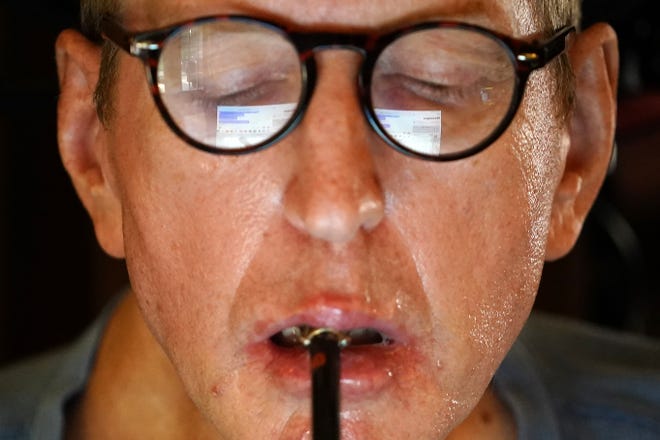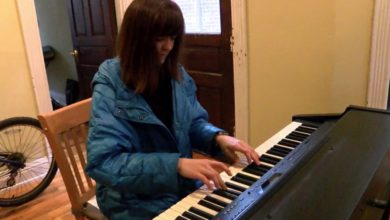

I miss big long conversations more than anything
Brett Walls says this by typing out a text with an elongated stylus he holds in his mouth. He moves his head up and down, pecking each letter on an iPad mounted to his wheelchair. His feet are strapped in and a blue towel sits on his chest to collect saliva.
Brett had a stroke in 2014, and it left him almost completely paralyzed. He doesn’t know what caused it, or why exactly it happened. He just knows his life will never be the same.
Now 57, Brett drives an electric wheelchair without using his hands, steering instead with sensors he controls by moving his head. When asked what people don't understand about his condition, he answers in texts.
How the mind stays active
Almost over active
Sometimes it feels like too much

Brett has a computer program that can speak for him, but he doesn’t use it much. He and his wife rarely talk anymore. It’s too difficult. And it takes too long.
To Gayle Payton Walls, it often feels like she’s playing the same game as her husband but on different fields. There are times, lots of times, she feels isolated and lonely. After his stroke, she quit her job as a personal chef to take care of him. She doesn’t cook much anymore.
It’s a reminder she is no longer just Brett’s wife. She’s also his caregiver.
There are times, lots of times, Brett feels terrible guilt. He wrote a poem giving his wife permission to leave. He’s also written about how grateful he is that she hasn’t.

Before his stroke, Brett was a restaurant manager. Before that, he’d been a musician, a hairstylist and a college dropout. He was someone who put hot sauce on everything he ate and who needed to create to feel alive.
After his stroke, and eight surreal months in the hospital, he felt dead. And afraid. He could still listen to music, but he couldn’t play it. He could read books, but he couldn’t hold them in his hands.
In the hospital, he watched endless reruns of “Pawn Stars,” “American Pickers” and “Oak Island.” He took pills crushed up and fed through a feeding tube.
One day after returning home, parked in his wheelchair on the edge of the woods, he thought about how he could stop obsessing over death. Because there were times Brett thought about killing himself.
In his wheelchair, he thought about driving into traffic. He thought about how every day seemed like a new low. He thought about his dependence on others. And he thought about how the stroke changed even his ability to enjoy spicy foods.
Then, he thought about how to start living again. He thought about how he could reclaim his voice.
After months of silence, Brett started writing. He didn’t have a stylus then, so he began composing short poems in his head. This would become his therapy, his religion and the way he communicated with the world. In his words, it would save his life.
In dreams
Never
Am I broken
Never
Mute and frozen
Bound in the electric chair
Mary Pierce Brosmer remembers visiting Brett in 2014. She was his teacher at Milford High School in the ’70s. She remembers he was expressive, creative and loved music. She also remembers he didn’t love school. When Mary heard about his stroke, she and another former student visited him in the hospital.
They read him poetry.
Brett remembers feeling like his body was behind a screen somewhere, slowly shutting down. Mary remembers silence. And she remembers crying in her car afterward.
‘It’s a beautiful day’
The room where Brett sleeps was once decorated with guitars and other instruments. Now, there are multiple wheelchairs in the corner, and the only sounds his instruments make come from cats brushing up against them.
Brett’s mother visits every day. She doesn’t get his poems, Brett says, but she is proud of him. On this warm day in September, she gives him a kiss. She asks him about his bed, and she doesn’t say much else.

That afternoon, Brett drives himself into the yard. It is sunny, and his neighbor is cutting the grass. Brett has trouble maneuvering around the corner of the home’s wheelchair ramp, and he almost tips over backward trying to get from the lawn to the driveway.
Still, he is happy to be here. Outside. In the sun.
“It’s a beautiful day,” Brett says through his voice application.
In his poems, Brett writes about fishing and climbing trees and exploring the woods as a boy with a toy rifle. He writes about cicadas. He writes about buzzards circling above him as he moves his wheelchair to prove he’s still breathing.
After I’ve sat here for years,
Will I still remember
The details I hold dear?
He writes about being unable to write. He writes about bugs crawling in his ears. He writes about the pier at East Fork State Park. He writes about spring and flowers and rain.
If he must die, Brett writes, let it be winter.
These poems offer a glimpse into his world. A world most can hardly understand. A world that became smaller after his stroke, but somehow also became more beautiful.
Simply put, a sunny day means more to him now. A concert means more. A stroll around the neighborhood means more. Because he can see the beauty others take for granted.
It’s truly amazing how much you notice when that’s all you can do.
‘I think I found a way to live’
Brett doesn’t want you to feel sorry for him. He wants you to know he is grateful to be alive, and to be aware. But that doesn't mean his life is easy. Because this is not the life he chose, yet this is the life he lives.
He can’t laugh like he used to, but he can smile. And he often does. When he talks about one of his old bands, Devil Nut Mother Hole, or when he jokes about Jeff Bezos.
I think I found a way to live with locked in syndrome
It's a terribly depressing and heavy condition
You have to cut through it somehow
The dense darkness will overwhelm you if you don’t stay vigilant
As Brett types these words, reggae music masks the silence in his home. Conversation bubbles appear and linger for several minutes. Gayle stands up from the couch and looks at Brett. She wants to know what he’s saying. And she doesn’t want to wait.
When she sees his iPad, she puts her hand on his shoulder.
I want to become a competent writer
Not just some disabled guy who writes poems
…
This year, Brett Walls published a book of poetry. It’s available on Amazon.
Source link








